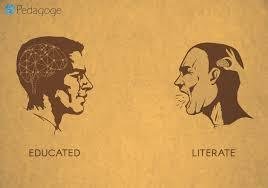We all must have grown up listening to the age old maxim, “Education is the key to a successful life” in some form or other. That this maxim holds substance is a point beyond doubt. Education is a medium of not only enlightenment but also empowerment. It has proven to be a social ladder for the historically backward communities. But, in this just full glorification of education, one tends to forget the true meaning of education. As a result we often end up equalizing education with just literacy. Education, however, is a complex phenomena. It’s not just limited to literacy or technical expertise. While both literacy and technical expertise are necessary to make sense of this complex world of ours, they alone did not constitute education. Education, in my understanding, is the opening up of the mind to diverse, complex, and unfamiliar ideas and information. A truly educated person is the one who is capable of independent cum rational thinking and making well-informed decisions in life.

However, often we fall prey to the tendency of judging one’s education merely by his/her degrees or rather I say, formal education. This has gained much currency among the privileged classes of society as a tool to look down upon the not so privileged section. Wards of this section of society has the privilege of studying in top class educational institutions with up-to-date curricula and latest technologies. This often creates an ambivalence in their minds regarding the ‘less educated section’. This so called ‘less educated section’ includes farmers, artisans, plumbers, grocers, etc.
There are primarily two major anomalies of this categorisation. First, as I said, education is a complex phenomena. It’s not a uniform process. It’s implication is different for different individuals. What’s education for a farmer need not be so for a scholar. Their training would necessarily be different, given the disparate nature of their work. While a farmer’s work serves our material needs, a scholar’s work serves our intellectual needs. For the former, understanding of which crop to grow, suitability of land, use of fertilizer, irrigation etc. constitutes education along with a given level of understanding of his/ her surroundings. While literacy is certainly an advantage, higher degree based education is not as much a necessity (However, I do not discount the importance of studies in agriculture or organic farming but most of them do not directly involve in the actual task of farming). For the scholar on the other hand rigorous training of complex concepts of and research in their chosen disciplines.
Secondly, in our glorification of formal education, one tends to lose sight of the fact that quality formal education is still a distant dream for a significant proportion of our population. Given the sheer poverty and lack of opportunities means that it become difficult for many students to carry on their education post high school. The quality of most government run schools, particularly in rural areas, is no secret and this did not help the cause of this students. Private schools are either absent or when present, are completely unaffordable for most of them. So, it’s important for us to have a sense that while formal education is utilitarian for some of us, for many it’s still a luxury.
Education, is without a doubt essential. And it’s encouragement and propagation a noble task. But while doing so, one should not lose sight of the meaning of true education and the socio-economic reality of our country.
The insightful reflections provided in this piece were penned by Rajdeep Mahanta from Assam.


